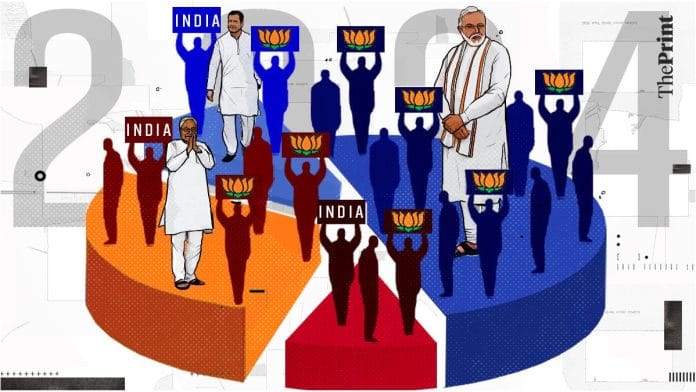Thank you dear subscribers, we are overwhelmed with your response.
Your Turn is a unique section from ThePrint featuring points of view from its subscribers. If you are a subscriber, have a point of view, please send it to us. If not, do subscribe here: https://englishdev.theprint.in/subscribe/
The modern politics are intertwined with the culture and society. As a result, politicians are utilizing all the tools and apparatus to target and identify the people. Some of the most common tools have been using emotions and social media to communicate a message that identifies with the voters or engage in activities that demonstrate politicians’ quest to redeem or recover some form of lost glory for their constituents.
Political culture includes political imaginations, dispositions, experiences, and values which shape political behaviour, and the environment for the political system. Political culture does not only include the official texts of government such as political speeches and policy documents but also the mediatized relationship that is prevalent between popular culture and the sphere of politics. The fact, the foregoing political culture involves the representation of politics in the television, broadcast news, press, and social media as well as the fictitious presentation of politics in TV shows, movies, and novels. Therefore, political culture entails the political thinking that is depicted both directly (through government official texts and media presentation) and indirectly through political behaviour and imagination. Due to this, politicians can effectively use political culture to popularize themselves and their agendas and by doing so, gain political power. This is the case in various regions of the world as reflected through world leaders such as Donald Trump of the USA and Narendra Modi of India as both are considered as faces of new mainstream and, well-known in the international business community. The huge win of the BJP in the 2014 parliamentary elections led to the argument for many political analysts that India’s liberal and secular society is now strongly in the grasp of Hindutva populism. Therefore, Modi promoted and identified with the idea of a ‘pure Hindu nation’ and his government was to improve and transform India’s reputation at local and international levels.
Rise of Right-Wing
In the case of Modi and right-wing populists, their superior tool has been to identify with the Hindus by selling the notion that the previous regimes have poorly treated the Hindus and therefore, they must regain their former glory by upholding Hindutva and suppressing the effects of the minority and the groups such as Muslims, Jews, and Christians have had in their country. His agenda is further backed by the desire to popularise Hindutva through trade restrictions in favour of India-made goods and fighting threats for its non-Hindu neighbours such as Pakistan.
Populism in India is one of the most extreme expressions that has arisen in recent decades. It marks a major change from the post-colonial policies of integration, pluralism and diversity adopted since 1947. Indeed, the nationalist ideology of the country is opposed to the notion of a secular, diverse and ethnic country. To understand the emergence of populism in India, right-wing populism is the ideal example. In the 2014 and 2019 elections, the Bhartiya Janata Party had a massive win that can be attributed to Hindutva populism.
Historically, Savarkar propounded India to be an ethno-cultural nationalism (Ranjan, 2020). Since its independence, ethnocultural nationalism remained at the foreplay of the country`s politics and national affairs. However, yearned to revert this through the 1950 constitution which recognized India as a multi-cultural and multi-religious country where people have equal rights as citizens. Despite the constitutional amendment, ethnocultural nationalism has been prevalent in India and recent years (especially in the Modi-era that started in 2014) the narrative has become prevalent. As a result of such politics, secular nationalism has been pushed towards the edges.
Psychological context
The psychosocial approach combines aspects of cultural studies, sociology, and psychology to explore the interaction of psychological and social processes that shape social experience and subjectivity. In other words, the psychosocial approach studies the entanglement that exists between the social life and the psychological approach. there is a clear relationship between identity, fantasy, and emotions within the current mediatized landscape of modern political culture. Therefore, the emotionalization of politics has been evident in various aspects of political culture for instance in the context of political policies, and political representation in various media and cultures. For instance, Politicians shed tears while faced with dilemmas or scenarios that require grieving or sympathizing with the marginalized, and so on. This has been evident in Modi`s campaigns, public rallies, and most other areas where he and his team are meeting the common people. On numerous occasions, Modi has been identifying with the prevailing emotions for instance grieving with victims of terror attacks. Furthermore, the relationship between leaders and their followers is shaped through processes of identification, mirroring, attachment and unconscious processes of play and illusion within the political arena. According to various scholars in the field of psychoanalysis, some populists tend to appease the emotions of the segment if the population has either been marginalized or ignored by the previous administration(s). In their message, they either spread a notion that they will restore the lost glory or recover some lost aspects such as the supremacy of the nation. In India, this is revealed in Modi`s address to the nation as well as in his day-to-day interactions with people.
These pieces are being published as they have been received – they have not been edited/fact-checked by ThePrint.


